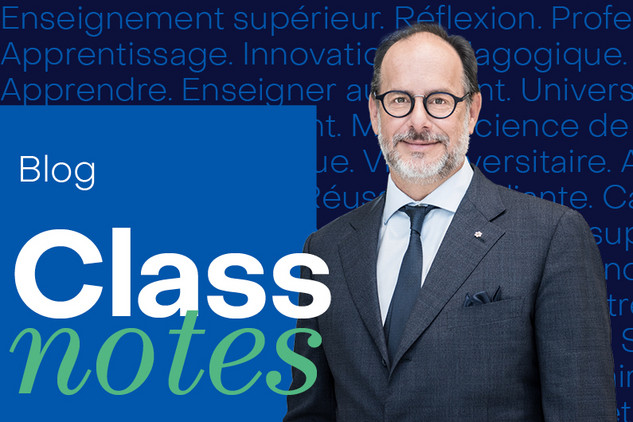I’m not a big fan of Marvel and DC Comics, but I do find it interesting that superheroes often have trouble getting into character. Clark Kent can't just be Superman; he first has to find a phone booth to change in. Highschooler Peter Parker can't simultaneously be himself and Spider-Man. Same thing for those mortals who transform themselves into Black Widow, the Incredible Hulk, Batman and Robin.
So what am? A professor or a researcher? Or both?
When people ask me what I do for a living, I always have to pause. Not yet two years into the job, I'm still getting used to saying I'm rector of a major university. Of course, I’m proud to hold the position (though it also makes my head spin), but if it's the first thing I mention, the conversation can go any number of ways. 'What's a rector?" people who know very little about universities will ask, and it takes me a while to explain. Others are a bit intimidated by the word (or pretend to be) and address me as “Monsieur le recteur,” bowing their heads as if I'm sort of cleric or noble. Still others say, “Oh, really!”, then, as I begin to ramble on, get that look in their eyes that says "Oh no, this is going to be boring!"
Usually, to cut to the chase, I just say that I’m a professor. That’s my go-to identity, the one I can call my own, as it's always been at the core of my professional existence. Even though I’ve devoted a major part of my life to research and writing, I've never felt talented enough to present myself as a "scholar," as some of my colleagues at English-language universities do. Of course, there's an easy way to say you're both: just call yourself an academic. But such a simple formula doesn't take into account the twin passions and responsibilities we each have: to teach and research, to create and discover.
A few years ago, in Paris, I attended a conference on interdisciplinarity. Among the speakers was a highly respected professor of public law, a leading authority in his field known for being innovative and unconventional. Some of his students were in their first year, so I asked him if he ever explained the original and interdisciplinary thinking that went into his work. “No," the professor replied, "I have to follow the program, which is carefully set out. Besides, they're new, these students – they can't yet understand the advanced subjects I’m working on.”
What a pity, I thought, to have such a point of view – and how misguided.
I am convinced that teaching and research must feed off each other, both in the classroom and in terms of ideas. I believe that exposure to research, as early as possible in one’s academic career, enhances rather than detracts from learning. I think that, in a society with fewer graduates from master's and PhD programs than elsewhere, more students need to discover the meaning of the word research.
(And tell me if you haven't heard this one: “You’re doing research? But what exactly are you searching for?”)
I’m also convinced that in this world where more and more players in the private sphere are increasing the supply of available training, universities stand out for their unique ability to combine the production and transmission of knowledge. Of course, we are already doing that at the graduate level and in some areas of clinical teaching. But we still have work to do to provide our undergraduate community with research opportunities in their fields of interest.
There are several ways to do this. Recruit these students as research assistants in our labs and fieldwork. Offer more opportunities to conduct research projects, for credit, under the direct supervision of faculty members. Organize seminars and lunch-and-learn sessions where our best researchers present their current work to our new students. Systematically discuss our basic and applied research projects in introductory courses in all disciplines.
In the coming months, we at Université de Montréal will be presenting a few initiatives of this kind—for instance, RECI (research & creation, community, international) —as part of our overall strategic plan. Our job now is to nurture the hope that our undergraduate programs will ignite interest in research throughout the student body, on all our campuses.
In the meantime, even if Clark Kent cannot simultaneously be a newspaper reporter and Superman, or Peter Parker a highschooler and Spider-Man, we academics can, on the contrary, try to be two things at once. Tearing down the silos of our identities as professors and scholars, we can raise our profile as researchers, wherever and whatever we happen to teach.
- Daniel Jutras
If you’d like to continue the conversation, please drop me a line.
